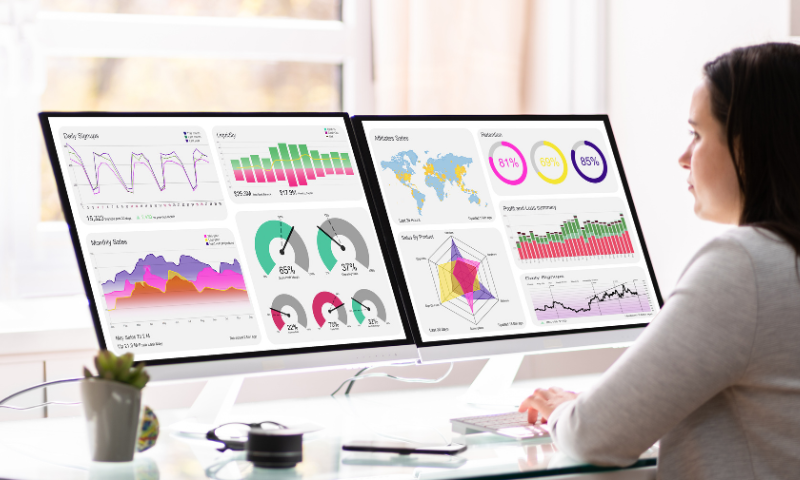Your career in Data: sector trends, skills and technologies
18 Jul, 202310 minsData is the future. According to the National Data Strategy, data is now the driving fo...

Data is the future. According to the National Data Strategy, data is now the driving force of the world’s modern economies. As technology continues to progress, the need for professionals with specialised knowledge and skills in data grows too. Processing, storage, analysis, and management – they’re all becoming increasingly essential for businesses across the globe.
Statista suggests that the UK data economy alone was worth £380 billion in 2020 and is predicted to exceed £580 billion by 2025. But some researchers believe that the full potential value of the country’s data economy could be considerably more.
There are approximately 7.6 million data professionals across Europe, with 1 million of those residing in the UK. There are a further 15 million (approx.) in the USA. Yet UK Government statistics estimate that almost half (46%) of British companies are struggling to recruit for a potential 178,000 to 234,000 data roles. With a projected 5% rise in employment between 2021 and 2031, data is one in demand profession.
So where to start? From Data Science and Big Data to Machine Learning and Data Governance, there are so many different areas of expertise and career paths to explore. In this blog post, we’ll look at some of these different areas, the skills required, the tech knowledge needed, and current data trends.
Data Science
Data science is the practice of analysing data, developing models, and generating actionable insights that can drive business decisions and solve complex problems. So, for a successful career in data science, you’ll need a combination of analytical, statistical, programming, and communication skills. A data scientist should be able to apply mathematical models and algorithms and communicate their findings to stakeholders.
Typical Data Science skills
- A degree in computer science, data science, mathematics, physics or statistics can be useful
- Strong analytical skills
- Statistical knowledge
- Programming skills, particularly in high demand languages like Python, R, and C
- Knowledge of databases and data structures
- Good communication skills
Data Science trends
Current trends in Data Science include advancements in machine learning and deep learning. Machine learning (think facial recognition, product recommendations, and email automation) and deep learning (like virtual assistants, chatbots, and translations) are now a standard part of everyday life for most of us. According to a survey by McKinsey, 56% of organisations were using (and benefitting from) machine learning in 2022.
With 86% of financial companies alone sharing they have plans to increase AI-related investments by 2025, the potential increase in the number of businesses advancing their machine and deep learning capabilities across all sectors is extensive!
Another Data Science area we now rely on daily is Natural language processing (NLP) (e.g. search results, predictive text and emails filters). Advances of platforms like ChatGPT fall into this specialist field. And alongside these is an increase in the need for data visualisation tools for improved data storytelling and data-to-action pipelines, like Tableau or Power BI. These trends are here to stay for the foreseeable, so great news for Data Scientists!
Data Engineering & Architecture
Data engineering and architecture focus on the design, development, and maintenance of data systems and infrastructure. The goal is to ensure data is stored, processed, and accessed efficiently and securely. Data engineers and architects should be able to create scalable systems that can handle large volumes of data, optimise data pipelines, and implement security measures.
Typical Data Engineering & Architecture skills
- Knowledge of database systems like SQL, NoSQL, or Hadoop
- Familiarity with cloud platforms like AWS, Azure or GCP
- Programming skills, particularly in languages like Python
- Understanding of data modelling and schema design
- Knowledge of data warehousing and ETL processes
- Development of data pipelines
- Data integration
- Data quality and validation
- Performance optimisation
Data Engineering & Architecture trends
And trends in data engineering/architecture? Well, let’s begin with cloud-based data warehousing. As a data enthusiast, you’ll be aware that data warehouses have been a staple in analytics and reporting for decades, but they were never designed to handle today’s explosion in data growth! That’s where cloud data warehousing comes into play, and it’s a hugely sought after area for organisations everywhere.
Next, let’s look at serverless computing; another skillset that companies are crying out for. If you have knowledge in well-known serverless services like AWS Lambda, Microsoft Azure Functions, Google Cloud Functions, and OpenWhisk you can help countless businesses to succeed.
A final trend in engineering/architecture is time stream processing. This increasingly popular analytics market was estimated to be worth USD 15.4 billion in 2021. And with a projected CAGR of 26.5% over the following five years, there are plenty of reasons for data specialists to take this route.
Business Intelligence
Business intelligence (BI) involves the use of data to support business decision-making. It focuses on creating dashboards, reports, and visualisations that provide insights into key performance indicators (KPIs). A BI analyst should be able to understand business requirements, translate them into data requirements, and design effective reports and dashboards.
Typical Business Intelligence skills
- Strong analytical skills
- Knowledge of database systems and SQL
- Familiarity with BI tools like Power BI or Tableau
- Understanding of data visualisation principles
- Good communication skills
- Ability to grasp business needs and manage stakeholders
Business Intelligence trends
What about some of the current trends in business intelligence? Well, a big one we’re seeing is embedded analytics. So, the embedding of real-time reports and dashboards, allowing end users to instantaneously analyse data. Think CRMs, ERPs, SCMs, inventory management platforms and reporting systems. This closely links with mobile BI, another area increasingly on the rise.
But let’s not forget data storytelling - another exciting area that’s suddenly everywhere. Combinations of compelling data visualisation, interactivity and classic storytelling are an ordinary part of our lives now and are an increasingly popular way of organisations portraying clear, easy-to-understand messages with narrative flow.
Data Analytics
Data analytics is perhaps one of the broadest terms in data. It refers to the process of collecting, cleaning, and analysing data to extract insights and encompasses many different techniques. Descriptive analytics, predictive analytics, and prescriptive analytics are just a few of the most common. And if you’re a Data Analyst, you’ll be able to work with large datasets, apply statistical models, and communicate their findings to stakeholders.
Typical Data Analytics skills
- Analytical skills
- Statistical knowledge
- Knowledge of databases and SQL
- Familiarity with data analysis tools like Excel or R
- Good communication skills
Data Analytics trends
Here are some data analytics trends: one of the largest we’re seeing is advanced analytics, like machine learning and neuro-linguistic programming (NLP). From text analytics that scour online interactions (think comments/reviews) to analyse what’s being said, to smart assistants like Apple’s Siri or Amazon’s Alexa with voice recognition – occurrences of these kind of NPL interactions are rapidly on the rise.
Augmented analytics are another example of how data analytics are now part of our daily practices. Retailers, manufacturers, banks, governments, and many other industries rely on augmented analytics for customer insights, preferences and segmentation, as well as inventory management and fraud detection. And while human intuition is still very much required, this kind of tech has become invaluable to businesses in improving processes.
We’ve also witnessed increased noise around data protection tools like Trifacta or Alteryx. As more and more companies seek reassurance around the protection of their data, we’re seeing a surge in the number of organisations wanting professionals with knowledge and skills in this area.
AI & Automation
Artificial intelligence (AI) is the branch of computer science that focuses on creating intelligent machines that can perform tasks that typically require human intelligence. It includes many different subfields, including natural language processing, computer vision, and robotics. As an AI engineer, you’ll be able to develop algorithms and software that can mimic human intelligence.
Typical AI & Automation skills
- Strong programming skills, particularly in languages like Python or Java
- Knowledge of machine learning algorithms and models
- Familiarity with deep learning frameworks like TensorFlow or Keras
- Understanding of natural language processing and computer vision
- Good problem-solving skills
AI & Automation trends
As for trends in AI, they currently include the increasing popularity of things like explainable AI, autonomous systems, reinforcement learning, and edge computing.
Why are these things becoming more in demand? Basically, they’re all advanced forms of AI that are designed to make tasks simpler, quicker, and more efficient. It’s now normal to see examples of AI in our daily lives – from robotic vacuum cleaners and verbal commands to auto transport (and eventually even driverless cars). In workplaces, we’re finding increasingly intelligent robotic production lines that not only manufacture goods but can identify and correct issues as they arise without the need for human interaction. Or perhaps you’ve seen things like smart windows in offices, that spontaneously adjust according to different temperatures and conditions.
This arm of data/AI also extends to things like customer care, going far beyond traditional automated CS systems, to provide different responses to happy versus disgruntled customers.
The list of examples, and the possibilities of AI are endless, making it a great choice for data experts to specialise in.
Big Data
Advances in the use of big data are allowing tech departments, as well as entire companies, make better informed decisions about their direction/offerings. We’re talking such vast amounts of information that it takes a dedicated and trained specialist to deal with it. Think you could be at the centre of managing that data? If so, a job in big data could be for you.
Big data roles are now common across lots of different sectors. In fact, according to recent estimates, 328.77 million terabytes of data are created daily. From healthcare and security to advertising/marketing and insurance, there are countless opportunities in which data professionals can make their mark.
Typical Big Data skills
- A higher degree in a quantitative subject (mathematics, statistics, etc.)
- Strong quantitative analysis skills
- Knowledge of programming languages (JavaScript, Python, SAS, SQL/NoSQL)
- Open-source frameworks for big data architectures, such as Spark and Hadoop
- Data visualisation capabilities
- Proficiencies in predictive analytics
- Data mining know-how
Big Data trends
Emerging trends in big data include Data as a Service (DAAS). We’re all familiar with Software as a Service (SAAS) because it’s been around much longer. But nowadays DAAS is just as big. These kinds of services make it simple for us to access, share and review data than ever before, providing us with bounds of information on-demand.
Other developments in big data are predictive analytics which are instrumental in helping organisations plan and strategize better than ever before. Also, data fabric for simplifying and data storage. And the phenomenon of quantum computing – the process of compressing billions of data at once to significantly reduce processing times.
Data Governance
With so much data available at our fingertips, it’s no wonder there’s also a growing need for data governance talent. Think you could set internal standards for the gathering, storage, usage, and disposal of data? If you have an interest in the legal side of technology, overseeing a company’s data governance is a great role for you. Writing and implementing policies, working with governing bodies and ensuring compliance are all key elements of a data governance role. You’ll obviously need tech capabilities too.
Typical Data Governance skills
- Outstanding data literacy skills
- Knowledge of data laws and ethics
- Understanding of data systems architecture
- Business acumen
- Change management skills
Data Governance trends
In terms of what’s happening in the world of data governance currently, we’re seeing lots of companies working to improve the management of their metadata. Jelani Harper notes, “Metadata Management will likely always persist as the nucleus of Data Governance.”
This coincides with a surge of companies pushing for the best data governance processes possible. According to a 2021 Gartner Data and Analytics (D&A) governance survey, 61% of leaders indicated a desire to optimize data for business processes and productivity. Yet only 42% believed they were on track to meet that goal. In other words, it’s an exciting time for people with the highly sought-after skills required to help businesses improve their data governance.
So, what’s your specialism? Whichever area of data you work in, or want to move into, Apollo Solutions works with a vast network of data professionals, and the companies that hire them. Want to take your data career to the next step? Why not give us a call to discuss how we can help?


